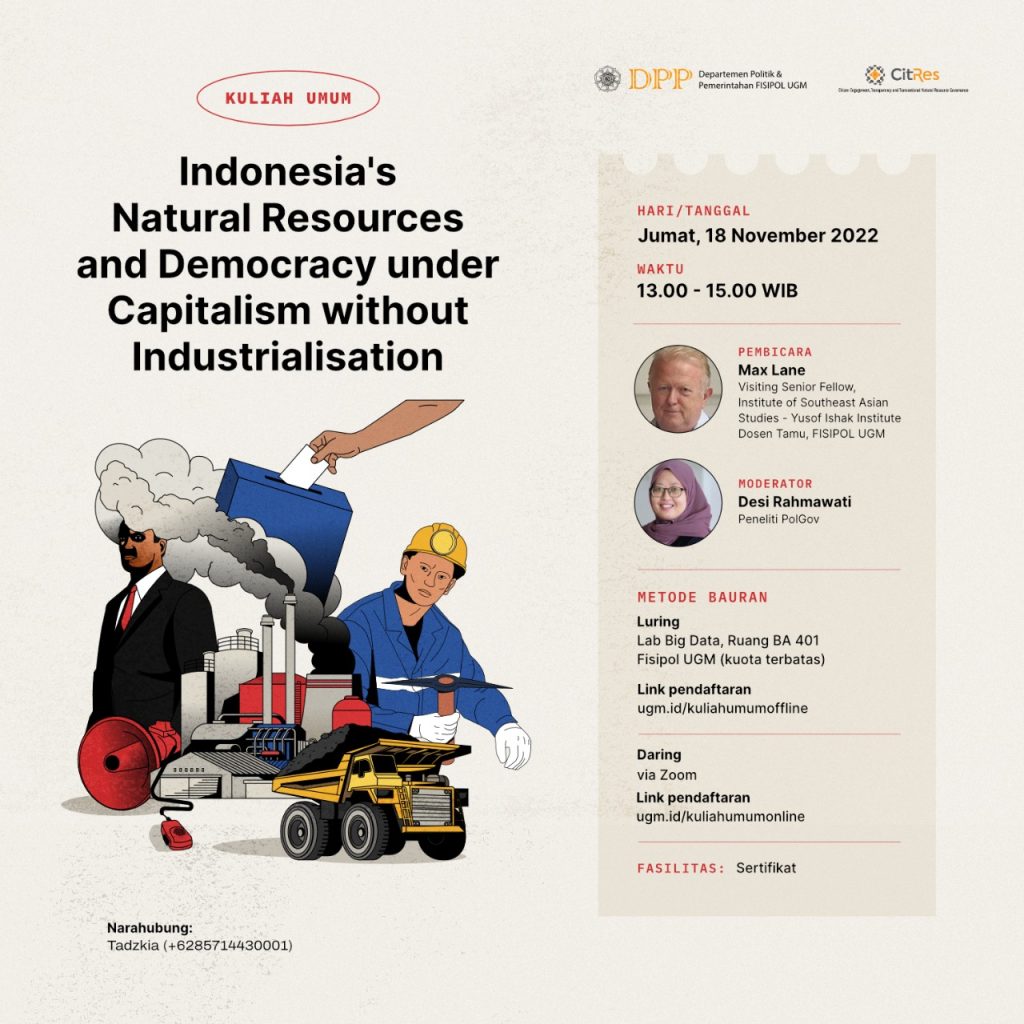Yogyakarta – As part of educational and research collaboration with the Norwegian University of Science and Technology, the Department of Politics and Government UGM held a public lecture “Indonesia’s Natural Resources and Democracy under Capitalism without Industrialization”. This activity was held on Friday, 18 November in Room 201, BA Building, FISIPOL, Universitas Gadjah Mada, Yogyakarta, and was facilitated by the Citizen Engagement and Natural Resource Governance Education (Citres-Edu) program.
This event presented Max Lane, Visiting Senior Fellow, Institute of Southeast Asian Studies – Yusof Ishak Institute, Visiting Lecturer at FISIPOL UGM, and also the author of the book Unfinished Nation: Memories of the Revolution in Mass Action and Indonesian History and Editor of the book, Continuity, and Change after Indonesia’s Reforms: Contributions to an Ongoing Assessment. The event hosted by Desi Rahmawati (PolGov UGM researcher) seeks to understand natural resource management in general in the context of the economic and political regime in Indonesia. Specifically, this discussion links natural resource management with a democratic system that works under capitalism without industrialization in Indonesia.
In his opening, Lane emphasized that natural resources are the key to Indonesia’s future. In this public lecture, Lane will not focus on certain natural wealth in Indonesia. He also analyzed democracy as part of the process of resource management.
Lane presented data showing Indonesia’s position as a poor country according to global GDP per capita figures. Lane said Indonesia is categorized as a poor country because it cannot carry out industrialization. Lane continued that Indonesia is still very dependent on imported machinery to support factory production which is important for industrialization. Reflecting on 2019 BPS data, the machine manufacturing sector in Indonesia contributes only 0.3% of GDP and 1% of the manufacturing sector.
Lane explained that Indonesia specifically, and countries in the Global South in general, could not carry out industrialization because there was no industrialization under Dutch colonialism. The Dutch East Indies government did not build any significant factories in Indonesia. Besides that, Lane said that Indonesia was also “robbed” so that, when it became independent, Indonesia did not have factories, universities, schools, and even owed the Netherlands.
Lane said that Indonesia is in a vicious cycle of colonialism’s curse. According to him, all former colonial countries in Asia, Africa and South America have experienced the same thing and have the same fate as Indonesia in relation to this legacy. This is related to productivity due to minimal industrialization so that the average productivity of all workers and society is stagnant or declining.
In this situation, the wealth of natural resources can become the basis of Indonesia’s sovereignty to improve its bargaining position in the future. Furthermore, to get out of this trap, Indonesia needs to work together with other countries in the Southern Hemisphere, for example through the BRICS, to advance their technology. Wealth of natural resources can also be the basis and key for negotiating with developed countries.
At the end of the discussion, Lane stated that cooperation based on natural resource wealth must be carried out democratically to improve Indonesia’s bargaining position. How democratic a country is can be seen from the extent to which correct information circulates and is debated in society so that people down to the grassroots have information regarding the situation of natural wealth in Indonesia. Indonesia needs an ongoing public debate regarding the fate of natural wealth as a vital asset in developing Indonesia.

